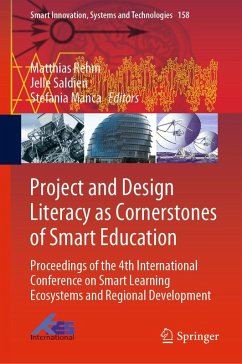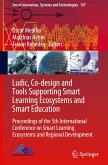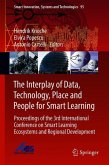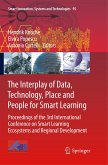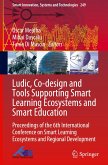Project and Design Literacy as Cornerstones of Smart Education
Proceedings of the 4th International Conference on Smart Learning Ecosystems and Regional Development
Herausgegeben:Rehm, Matthias; Saldien, Jelle; Manca, Stefania
Project and Design Literacy as Cornerstones of Smart Education
Proceedings of the 4th International Conference on Smart Learning Ecosystems and Regional Development
Herausgegeben:Rehm, Matthias; Saldien, Jelle; Manca, Stefania
- Gebundenes Buch
- Merkliste
- Auf die Merkliste
- Bewerten Bewerten
- Teilen
- Produkt teilen
- Produkterinnerung
- Produkterinnerung
The book includes high-quality papers presented at the 4th International Conference on Smart Learning Ecosystems and Regional Development at Università Roma Tor Vergata, Italy, from 22 to 24 May, 2019. Providing insights into the relevance of smart learning ecosystems (schools, campuses, the workplace, informal learning contexts, etc.) for regional development and social innovation, it also discusses how citizens' involvement with smart ecosystems can be increased and made more effective.
Andere Kunden interessierten sich auch für
![Project and Design Literacy as Cornerstones of Smart Education Project and Design Literacy as Cornerstones of Smart Education]() Project and Design Literacy as Cornerstones of Smart Education108,99 €
Project and Design Literacy as Cornerstones of Smart Education108,99 €![Ludic, Co-design and Tools Supporting Smart Learning Ecosystems and Smart Education Ludic, Co-design and Tools Supporting Smart Learning Ecosystems and Smart Education]() Ludic, Co-design and Tools Supporting Smart Learning Ecosystems and Smart Education116,99 €
Ludic, Co-design and Tools Supporting Smart Learning Ecosystems and Smart Education116,99 €![Ludic, Co-design and Tools Supporting Smart Learning Ecosystems and Smart Education Ludic, Co-design and Tools Supporting Smart Learning Ecosystems and Smart Education]() Ludic, Co-design and Tools Supporting Smart Learning Ecosystems and Smart Education116,99 €
Ludic, Co-design and Tools Supporting Smart Learning Ecosystems and Smart Education116,99 €![The Interplay of Data, Technology, Place and People for Smart Learning The Interplay of Data, Technology, Place and People for Smart Learning]() The Interplay of Data, Technology, Place and People for Smart Learning116,99 €
The Interplay of Data, Technology, Place and People for Smart Learning116,99 €![The Interplay of Data, Technology, Place and People for Smart Learning The Interplay of Data, Technology, Place and People for Smart Learning]() The Interplay of Data, Technology, Place and People for Smart Learning116,99 €
The Interplay of Data, Technology, Place and People for Smart Learning116,99 €![Ludic, Co-design and Tools Supporting Smart Learning Ecosystems and Smart Education Ludic, Co-design and Tools Supporting Smart Learning Ecosystems and Smart Education]() Ludic, Co-design and Tools Supporting Smart Learning Ecosystems and Smart Education139,99 €
Ludic, Co-design and Tools Supporting Smart Learning Ecosystems and Smart Education139,99 €![Ludic, Co-design and Tools Supporting Smart Learning Ecosystems and Smart Education Ludic, Co-design and Tools Supporting Smart Learning Ecosystems and Smart Education]() Ludic, Co-design and Tools Supporting Smart Learning Ecosystems and Smart Education139,99 €
Ludic, Co-design and Tools Supporting Smart Learning Ecosystems and Smart Education139,99 €-
-
-
The book includes high-quality papers presented at the 4th International Conference on Smart Learning Ecosystems and Regional Development at Università Roma Tor Vergata, Italy, from 22 to 24 May, 2019. Providing insights into the relevance of smart learning ecosystems (schools, campuses, the workplace, informal learning contexts, etc.) for regional development and social innovation, it also discusses how citizens' involvement with smart ecosystems can be increased and made more effective.
Produktdetails
- Produktdetails
- Smart Innovation, Systems and Technologies 158
- Verlag: Springer / Springer Nature Singapore / Springer, Berlin
- Artikelnr. des Verlages: 978-981-13-9651-9
- 1st edition 2020
- Seitenzahl: 304
- Erscheinungstermin: 27. September 2019
- Englisch
- Abmessung: 241mm x 160mm x 22mm
- Gewicht: 584g
- ISBN-13: 9789811396519
- ISBN-10: 9811396515
- Artikelnr.: 56911074
- Herstellerkennzeichnung Die Herstellerinformationen sind derzeit nicht verfügbar.
- Smart Innovation, Systems and Technologies 158
- Verlag: Springer / Springer Nature Singapore / Springer, Berlin
- Artikelnr. des Verlages: 978-981-13-9651-9
- 1st edition 2020
- Seitenzahl: 304
- Erscheinungstermin: 27. September 2019
- Englisch
- Abmessung: 241mm x 160mm x 22mm
- Gewicht: 584g
- ISBN-13: 9789811396519
- ISBN-10: 9811396515
- Artikelnr.: 56911074
- Herstellerkennzeichnung Die Herstellerinformationen sind derzeit nicht verfügbar.
Dr. Matthias Rehm received his Diploma and Doctoral degrees (with honors) in 1998 and 2001, respectively, from the Bielefeld University in Germany. In 2008, he successfully completed his habilitation process in Informatics at the University of Augsburg in Germany. He is the Head of the Human-Machine Interaction Group in the Department of Architecture, Design, and Media Technology and will be leading the upcoming cross-departmental Human Centered Robot Interaction Lab at the Technical Faculty of IT and Design at Aalborg University. His research is focused on modeling social, affective, and cultural aspects of everyday behavior for intuitive human-machine interactions. He has over 100 peer-reviewed publications in the area of robotics, HCI, technology-enhanced learning, multimodal interaction, and culture-aware technology. In 2010, he became founding and steering group member of Aalborg University's cross-departmental robotics program Aalborg U Robotics. In 2014, he co-foundedan international, Canadian-based startup that is actively pushing the limits in smart learning technologies. In 2015, he was elected vice president for the International Association for Smart Learning Ecosystems and Regional Development. Dr. Jelle Saldien is an Associate Professor in the Department of Industrial Systems Engineering and Product Design of the Faculty of Engineering and Architecture at Ghent University, Belgium. He received his M.S. degree in Industrial Science ICT at DeNayer Institute (now KULeuven) in 2003 and an additional M.S. degree in Product Development at Artesis (now UAntwerpen) in 2005. In 2009, he received his Ph.D. at the Vrije Universiteit Brussel on the design and development of the social robot Probo. From 2010, he was lecturer in Industrial Design at the Howest University College West Flanders. Since 2013, he is appointed as a Professor of Industrial Design at Ghent University, research coordinator of the UGent Industrial DesignCenter, and from 2014-2017 steering member of Flanders Make VD4. Jelle Saldien is author of over 60 technical publications, proceedings, editorials, and books. He is member of the program committee of the ACM SIGCHI International Conference on Tangible, Embedded and Embodied Interaction (TEI). His research looks at the design of interactions between human and product (Interaction Design). Dr. Stefania Manca is a researcher at the Institute of Educational Technology of the National Research Council of Italy. She has been active in the field of educational technology, technology-based learning, distance education, and e-learning since 1995. She is currently investigating the value of social media and social networking sites for formal and informal learning purposes and in teachers' and faculty staff's professional development. She is also involved in the analysis of participatory practices in formal contexts of learning according to the Student Voice approach,and in the use of social network site use by persons with disabilities.Among her research interests, there are also MOOCs, pedagogical approaches to learning analytics and big data. She has published numerous articles on these topics and given presentations in conferences. She is member of several journal scientific committees, editorial boards, and co-director of the Italian Journal of Educational Technology, one of the most highly ranked Italian journals in this area.
Educating the next generation of social innovators.- Teaching Experience Design using poems as cultural probes.- The International Summer School for Advanced Studies UniBS: CONTEMPORARY IDENTITIES. Interweaving spaces and relations in the design of living services.- Towards a DSS: a toolkit for processes of co-designing.- The impact of a research-based institutional strategy for opening up educational practices: The case of the MOOC-Maker project.- Engagement in a Blended University Course.- Empowering Engagement in a Technology Enhanced Learning Environment.- The ASLERD Pyramid of Smartness: a study on the stability of indices and indicators in schools.- Smartness comparison amongst different age-group students in an integrated school: the potential for design and management.- A Multidimensional space approach to Innovative Learning Environments.- Concept integration to develop next generation of technology enhanced learning systems.- Improving Writing for Romanian Language.- Aprototype for the automatic assessment of Critical Thinking.- Prediction of Newcomer Integration in Online Knowledge Building Communities using Time Series Analyses.- Challenge of Talent Attraction in Small and Medium Urban Areas: Case of Valmiera City, Latvia.- Smart City Community Engagement Through Learning.- Meaningful Learning by Creating technology-mediated Knowledge Boundary Objects between School and the Workplace.- Smartwatches for Context-Aware Ubiquitous Learning.- Game-based mobile learning with augmented reality: Are teachers ready to adopt it?.- Services, Schools and Skills: Mobile Media and local development in a South African rural area.- A Cognitive-Driven BCI-Based E-Learning Platform For Learning Disorders: A Preliminary Study.- The structured methodological framework "deejay": foundation and its application to the design of an ASD-oriented AAC tool.- Creating New Learning Experiences for Students with Dyslexia: a Design Thinking and Human-Centered Approach.- Development of a Smart Cycling Support Device for People with an Intellectual Disability.- Social coordination in Human-Robot Interaction through reciprocal engagement.
Educating the next generation of social innovators.- Teaching Experience Design using poems as cultural probes.- The International Summer School for Advanced Studies UniBS: CONTEMPORARY IDENTITIES. Interweaving spaces and relations in the design of living services.- Towards a DSS: a toolkit for processes of co-designing.- The impact of a research-based institutional strategy for opening up educational practices: The case of the MOOC-Maker project.- Engagement in a Blended University Course.- Empowering Engagement in a Technology Enhanced Learning Environment.- The ASLERD Pyramid of Smartness: a study on the stability of indices and indicators in schools.- Smartness comparison amongst different age-group students in an integrated school: the potential for design and management.- A Multidimensional space approach to Innovative Learning Environments.- Concept integration to develop next generation of technology enhanced learning systems.- Improving Writing for Romanian Language.- Aprototype for the automatic assessment of Critical Thinking.- Prediction of Newcomer Integration in Online Knowledge Building Communities using Time Series Analyses.- Challenge of Talent Attraction in Small and Medium Urban Areas: Case of Valmiera City, Latvia.- Smart City Community Engagement Through Learning.- Meaningful Learning by Creating technology-mediated Knowledge Boundary Objects between School and the Workplace.- Smartwatches for Context-Aware Ubiquitous Learning.- Game-based mobile learning with augmented reality: Are teachers ready to adopt it?.- Services, Schools and Skills: Mobile Media and local development in a South African rural area.- A Cognitive-Driven BCI-Based E-Learning Platform For Learning Disorders: A Preliminary Study.- The structured methodological framework "deejay": foundation and its application to the design of an ASD-oriented AAC tool.- Creating New Learning Experiences for Students with Dyslexia: a Design Thinking and Human-Centered Approach.- Development of a Smart Cycling Support Device for People with an Intellectual Disability.- Social coordination in Human-Robot Interaction through reciprocal engagement.

